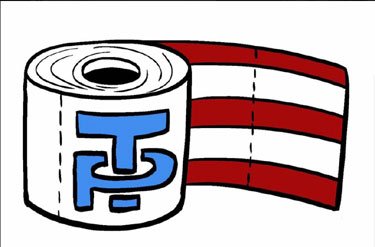Category Archive '2016 Election'
19 Jul 2016


Last night, Rudolph Giuliani described a modest, altruistic, publicity-shunning Trump. Uh huh. Right. Let’s compare the reality, described in the New Yorker, by Trump’s ghost writer for “The Art of the Deal.”
No, Virginia, he never wrote anything himself.
“I put lipstick on a pig,†he said. “I feel a deep sense of remorse that I contributed to presenting Trump in a way that brought him wider attention and made him more appealing than he is.†He went on, “I genuinely believe that if Trump wins and gets the nuclear codes there is an excellent possibility it will lead to the end of civilization.â€
If he were writing “The Art of the Deal†today, Schwartz said, it would be a very different book with a very different title. Asked what he would call it, he answered, “The Sociopath.†…
Schwartz thought that “The Art of the Deal†would be an easy project. The book’s structure would be simple: he’d chronicle half a dozen or so of Trump’s biggest real-estate deals, dispense some bromides about how to succeed in business, and fill in Trump’s life story. For research, he planned to interview Trump on a series of Saturday mornings. The first session didn’t go as planned, however. After Trump gave him a tour of his marble-and-gilt apartment atop Trump Tower—which, to Schwartz, looked unlived-in, like the lobby of a hotel—they began to talk. But the discussion was soon hobbled by what Schwartz regards as one of Trump’s most essential characteristics: “He has no attention span.â€
In those days, Schwartz recalls, Trump was generally affable with reporters, offering short, amusingly immodest quotes on demand. Trump had been forthcoming with him during the New York interview, but it hadn’t required much time or deep reflection. For the book, though, Trump needed to provide him with sustained, thoughtful recollections. He asked Trump to describe his childhood in detail. After sitting for only a few minutes in his suit and tie, Trump became impatient and irritable. He looked fidgety, Schwartz recalls, “like a kindergartner who can’t sit still in a classroom.†Even when Schwartz pressed him, Trump seemed to remember almost nothing of his youth, and made it clear that he was bored. Far more quickly than Schwartz had expected, Trump ended the meeting.
Week after week, the pattern repeated itself. Schwartz tried to limit the sessions to smaller increments of time, but Trump’s contributions remained oddly truncated and superficial.
“Trump has been written about a thousand ways from Sunday, but this fundamental aspect of who he is doesn’t seem to be fully understood,†Schwartz told me. “It’s implicit in a lot of what people write, but it’s never explicit—or, at least, I haven’t seen it. And that is that it’s impossible to keep him focussed on any topic, other than his own self-aggrandizement, for more than a few minutes, and even then . . . †Schwartz trailed off, shaking his head in amazement. He regards Trump’s inability to concentrate as alarming in a Presidential candidate. “If he had to be briefed on a crisis in the Situation Room, it’s impossible to imagine him paying attention over a long period of time,†he said. …
But Schwartz believes that Trump’s short attention span has left him with “a stunning level of superficial knowledge and plain ignorance.†He said, “That’s why he so prefers TV as his first news source—information comes in easily digestible sound bites.†He added, “I seriously doubt that Trump has ever read a book straight through in his adult life.†During the eighteen months that he observed Trump, Schwartz said, he never saw a book on Trump’s desk, or elsewhere in his office, or in his apartment.
Other journalists have noticed Trump’s apparent lack of interest in reading. In May, Megyn Kelly, of Fox News, asked him to name his favorite book, other than the Bible or “The Art of the Deal.†Trump picked the 1929 novel “All Quiet on the Western Front.†Evidently suspecting that many years had elapsed since he’d read it, Kelly asked Trump to talk about the most recent book he’d read. “I read passages, I read areas, I’ll read chapters—I don’t have the time,†Trump said. …
Schwartz has heard some argue that there must be a more thoughtful and nuanced version of Donald Trump that he is keeping in reserve for after the campaign. “There isn’t,†Schwartz insists. “There is no private Trump.†…
Schwartz describes the process of trying to make Trump’s voice palatable in the book. It was kind of “a trick,†he writes, to mimic Trump’s blunt, staccato, no-apologies delivery while making him seem almost boyishly appealing. One strategy was to make it appear that Trump was just having fun at the office. “I try not to take any of what’s happened too seriously,†Trump says in the book. “The real excitement is playing the game.â€
In his journal, Schwartz wrote, “Trump stands for many of the things I abhor: his willingness to run over people, the gaudy, tacky, gigantic obsessions, the absolute lack of interest in anything beyond power and money.†Looking back at the text now, Schwartz says, “I created a character far more winning than Trump actually is.†The first line of the book is an example. “I don’t do it for the money,†Trump declares. “I’ve got enough, much more than I’ll ever need. I do it to do it. Deals are my art form. Other people paint beautifully on canvas or write wonderful poetry. I like making deals, preferably big deals. That’s how I get my kicks.†Schwartz now laughs at this depiction of Trump as a devoted artisan. “Of course he’s in it for the money,†he said. “One of the most deep and basic needs he has is to prove that ‘I’m richer than you.’ †As for the idea that making deals is a form of poetry, Schwartz says, “He was incapable of saying something like that—it wouldn’t even be in his vocabulary.†He saw Trump as driven not by a pure love of dealmaking but by an insatiable hunger for “money, praise, and celebrity.†Often, after spending the day with Trump, and watching him pile one hugely expensive project atop the next, like a circus performer spinning plates, Schwartz would go home and tell his wife, “He’s a living black hole!â€
Schwartz reminded himself that he was being paid to tell Trump’s story, not his own, but the more he worked on the project the more disturbing he found it. In his journal, he describes the hours he spent with Trump as “draining†and “deadening.†Schwartz told me that Trump’s need for attention is “completely compulsive,†and that his bid for the Presidency is part of a continuum. “He’s managed to keep increasing the dose for forty years,†Schwartz said. After he’d spent decades as a tabloid titan, “the only thing left was running for President. If he could run for emperor of the world, he would.â€
Read the whole thing.
19 Jul 2016

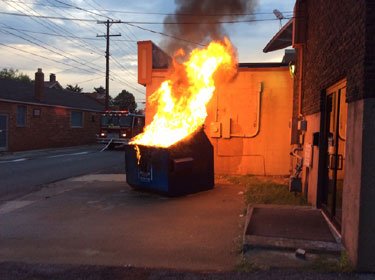
The Hay Ride called it a dumpster fire, rather than a convention.
Arkansas Congressman Steve Womack as presiding officer just called voice votes his own way, and rammed through Convention Rules denying eleven states on the record as asking for a roll call vote due process. The convention floor erupted in anger, and the Iowa and Colorado delegations walked out.
Former Senator Gordon Humphrey of New Hampshire said:
I sought to be recognized to raise a point of parliamentary inquiry and was immediately drowned out by people I would refer to as brownshirts in my surroundings. … You just saw the second most important item of business rushed through in a split second with no opportunity for debate, no opportunity for questions, no opportunity for points of order and no roll call vote although nine states under the rules requested a roll call vote, demanded a roll call vote, and should have been accorded that. So this was pretty shocking and shameful, I’ve seen a lot of, but this is not a meeting of the Republican National Committee. This is a meeting of brownshirts.
Totalitarianism was accompanied by unusual informality and carefully-assumed folksiness.
The informal speakers started off with Duck Dynasty’s hirsute Willie Robertson, wearing a patriotic American flag headband (!), with an open-collared pink polo shirt.

Marcus Luttrell survived Afghanistan, but apparently no necktie he owned did. He, too, addressed the convention with his collar wide open.
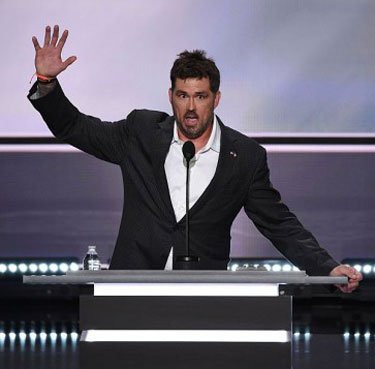
Former CIA Security Contractors from Benghazi John Tiegan and Mark Geist set some kind of new record for convention informality: neither wore a necktie, both addressed the convention wearing blue jeans, Tiegan’s jacket was patterned in some newfangled oil-stained camo and failed to cover a gold-and-silver belt buckle the size of a paperback book. Where are these guys’ former Marine Corps Drill Instructors when you need them?

The band later segued abruptly from “Brown-Eyed Girl” to “We Are the Champions” as Trump himself appeared suddenly silhouetted in smoke (having apparently arrived from his office in the Infernal Regions) to introduce his heavily-accented Croatian wife, Melania (who is, surprisingly, actually supporting him).
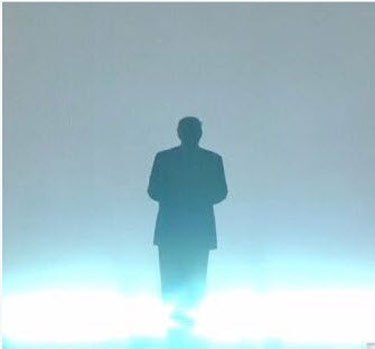
Melania proceeded to deliver a not-very-interesting speech, plagiarized in part, it turned out, from Michelle Obama (!).
Rudolph Giuliani, however, demonstrated that he, at least, really can deliver a barn-burner of a speech, in which he praised Donald Trump’s big heart and portrayed The Donald as a publicity-averse do-gooder. You could hear jaws dropping all over America.

I suppose the partisan rhetoric and hokum wasn’t that much worse than that at any other convention, but over everything hung the air of astonishment and the gloomy recognition that these people, this Republican Party, this GOP establishment had so readily, and so completely, sold out to an unprincipled, unethical demagogue peddling a bunch of unconservative snake-oil largely in complete contradiction to everything the Republican Party has theoretically stood for since 1980 at least, if not 1964.
I guess it all proves that those low-information Alt-Right peckerwoods were right, and we Movement Conservative intellectuals were wrong: the GOP establishment really is comprised of a bunch of total whores and opportunists.
I’m changing my voter registration to Independent today.
18 Jul 2016

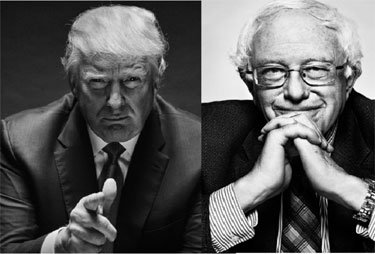
Jeffrey Tucker explains that the Trump Nationalist agenda is just another version of Socialism, and that the world has seen the rise of precisely this kind of nationalist socialism before.
The rise of Fascism and Nazism was not a reaction against the socialist trends of the preceding period,†wrote Hayek, “but a necessary outcome of those tendencies.†In Hayek’s reading, the dynamic works like this. The socialists build the state machinery, but their plans fail. A crisis arrives. The population seeks answers. Politicians claiming to be anti-socialist step up with new authoritarian plans that purport to reverse the problem. Their populist appeal taps into the lowest political instincts (nativism, racism, religious bigotry, and so on) and promises a new order of things under better, more efficient rule.
Hayek’s thesis is very similar to Mises’: that the greatest threat in the world today comes from a version of socialism — a rightist socialism — cobbled together in the name of fighting authoritarianism abroad and countering leftism at home. The road to serfdom, in Hayek’s view, is paved by a blind pursuit of unified nationhood and central planning in the name of national greatness. Or, to use today’s language, “making America great again.â€
Donald Trump, Bernie Sanders and Hillary Clinton agree on a lot, especially on the need to protect and enlarge state power. None of them accepts any principled limits on what the state may rightfully do to the individual. Even on big issues where one might think they disagree — healthcare, immigration, and control of lands by the federal government — their positions are more alike than different. …
Most of these candidates’ supporters don’t see it that way, of course. They imagine themselves to be rebels fighting power itself, however they want to define it: Wall Street, the party establishment, the paid-off politicians, the bureaucracy, the billionaires, the foreigners, the special interests, and so on.
But notice that neither Trump, Sanders, nor Clinton attacks government authority as such. Instead they aspire to use it and grow it for their purposes. “The conflict between the Fascist or National-Socialist and the older socialist parties must indeed very largely be regarded as the kind of conflict which is bound to arise between rival socialist factions,†Hayek wrote. “There was no difference between them about the question of it being the will of the state which should assign to each person his proper place in society.â€
As the campaign progress over 2015, the close relationship between right and left socialisms became more obvious. On the surface, Bernie Sanders and Donald Trump represent opposite extremes. But in their celebration of the nation state as the people’s salvation — their burning calls to overthrow the existing elites and replace them with a more intense form of top-down rule — they are morally indistinguishable, and equally un-American.
Read the whole thing.
12 Jul 2016

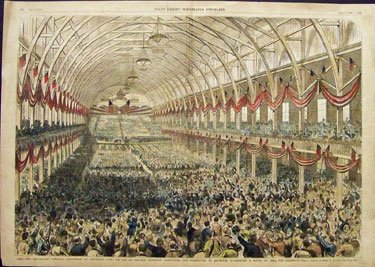
1876 Republican Convention in Cincinnati
At the Hill, Curley Haugland and Sean Parnell explain both the history and the law.
As the Republican National Convention prepares to kick off next week in Cleveland, there is a lot of confusion and controversy over the question of whether delegates to the convention are “bound†to vote for any particular candidate as a result of primary or caucus results, or state party directions.
The controversy stems from the fact that a large number of delegates believe they cannot in good conscience vote for presumed nominee Donald Trump, while the confusion stems from either a misunderstanding of the history and rules of the Republican National Convention, or more recently a blizzard of misinformation and misdirection coming from those who wish delegates were bound
Here are the facts about delegates to the Republican National Convention and efforts to bind their vote according to primary results or instructions from their state party.
Republican delegates to the national convention have always been unbound by national party rules, with the single exception. The issue was decisively settled in 1876 when delegates voted 395 to 353 to uphold past rulings stating that delegates could not be bound to vote against their conscience. Following the vote, the chairman of the convention summarized the party’s position by saying “[I]t is he right of every individual member thereof to vote his individual sentiments.â€
In the following convention in 1880, rules committee chair James A. Garfield, who wound up winning the nomination himself on the 36th ballot and the White House that fall, wrote what is today Rule 37(b) of the temporary rules of the convention. This rule was enacted specifically to provide a mechanism that would ensure every delegate was unbound and free to vote their conscience, and it gave every delegate the right to challenge his delegation’s announced vote on the floor of the convention and have his vote recorded as he wished.
In rejecting the binding of delegates, both the 1876 and 1880 conventions were embracing what had been the understanding of previous conventions dating back to 1856, the first Republican National Convention. At both 1860 and 1868 conventions, some delegations arrived with instructions or recommendations from their state conventions on which candidate to vote for, and at both conventions the right of delegates to ignore those directions and vote their consciences was upheld.
The Republican National Convention has also historically rejected the idea that state laws could bind delegates any more than state party rules or directions could. The very first time delegates were supposedly bound by state law was at the 1912 convention.
Both the Illinois and Oregon delegations announced that state law dictated how they were to vote, but that some delegates did not want to vote as ordered. In the same way the Republican convention had always rejected any sort of binding, those delegates were allowed to vote according to their consciences and ignore state law. The Oregon delegation made similar announcements in 1916 and 1920, and each time delegates were allowed to ignore state law and vote their consciences.
Although some claim it is “illegal†for delegates to defy state laws instructing them how to vote, the U.S. Supreme Court held in two cases nearly forty years ago that state laws could not trump national party rules. Part of their reasoning was that political parties must be free from government control, particularly in matters as important as who the party’s nominee would be, delegate selection, and how delegates could vote.
A careful reading of the rules passed by the 2012 Republican National Convention proves this to be the common understanding and practice of the party. Rules 14 and 16, which govern the election and selection of delegates to the convention, include several references to the fact that the national convention is free to ignore state law, including two occasions where rules begin with the phrase “No state law shall be observed…â€
And Rule 16(b)(1) stipulates that state party rules take precedence over state laws governing the election and selection of delegates, and that national party rules take precedence over both. So clearly the national party does not accept that state laws can supersede either state or national party rules.
The only time delegates have been bound by primary results or anything else was in 1976, when the campaign of President Gerald Ford pushed through a rule requiring votes from nineteen states with laws purporting to bind delegates be announced and recorded as if those laws were valid. It was widely understood at the time those laws were unconstitutional as a result of a recent Supreme Court ruling, but the rule was sufficient to bind delegates’ votes for the first time in Republican National Convention history. …
In short, the history of the Republican National Convention proves that delegates have always, with the exception of 1976, been free to vote their conscience, and the rule that has protected this right over the last 136 years remains part of the temporary rules of the 2016 convention. The U.S. Supreme Court’s rulings on the issue also make clear that delegates are free to ignore state laws purporting to bind them, and the one national party rule purporting to bind delegates expires at the start of the convention.
These facts make clear that all delegates are completely unbound and free to vote their conscience on any and all matters that come before them, including the first ballot to decide the party’s nominee for president. No rule change is needed to unbind delegates, so long as the party stands by its 160-year history (aside from the blemish of 1976) protecting this important right.
———————-
The Washington Post reported that a federal judge in Richmond ruled on Monday that Virginia can’t require Republican National Convention delegates to back Donald Trump.
U.S. District Judge Robert Payne said the Virginia state law requiring delegates who oppose Mr. Trump to vote for him next week at the party’s convention creates “a severe burden†on First Amendment rights.
But Judge Payne explicitly avoided weighing in on whether Republican National Committee rules requiring convention delegates to follow the results of their states as dictated by state and national party rules. Judge Payne said he “lacks jurisdiction to adjudicate†the broader unbinding question.
The Republican Party’s rules explicitly state that they take precedent over state laws and state party rules.
Judge Payne’s ruling has no impact on the rules of the GOP convention, which will be determined by the convention’s Rules Committee when it begins meeting Thursday.
10 Jul 2016


Liberal democrat Maureen Dowd is not exactly thrilled with her party’s impending nominee. Hey! why should we be the only ones with a crappy, hideously undesirable candidate?
[T]he email transgression is not a one off. It’s part of a long pattern of ethical slipping and sliding, obsessive secrecy and paranoia, and collateral damage.
Comey’s verdict that Hillary was “negligent†was met with sighs rather than shock. We know who Hillary and Bill are now. We’ve been held hostage to their predilections and braided intrigues for a long time. (On the Hill, Comey refused to confirm or deny that he’s investigating the Clinton Foundation, with its unseemly tangle of donors and people doing business with State.)
We’re resigned to the Clintons focusing on their viability and disregarding the consequences of their heedless actions on others. They’re always offering a Faustian deal. This year’s election bargain: Put up with our iniquities or get Trump’s short fingers on the nuclear button.
Now she’s complaining. I don’t exactly remember, but I’d bet dollars to doughnuts that Maureen Dowd was a staunch MoveOn.org supporter, back when Republicans were trying to bring Bill to justice.
09 Jul 2016

Hat tip to Vanderleun.
08 Jul 2016


Golf Buddies
Erick Erickson has endorsed my own theory.
During the eleven years I ran RedState, I worked to actively squash a lot of conspiracy theories. …
My friend Donald Rumsfeld once said that there really are no conspiracies out there because no one can keep a secret. I tend to think he is right.
But there is one conspiracy theory I’m starting to embrace. I’m really coming to believe that Donald Trump is a Bill and Hillary Clinton operation to get Hillary Clinton elected.
A Republican candidate running for office would spend this entire week attacking Hillary Clinton for mishandling classified information.
Instead, Trump has attacked Republicans and praised Saddam Hussein.
A Republican candidate running for office would spend lots of time in swing states. Instead, Trump is focused on New York and Scotland.
A Republican candidate, when asked by the New York Times about serving if elected, would mock the reporter and make it clear how he will serve instead of play golf like Barack Obama. Instead, Trump would not commit to actually serving.
Donald Trump managed to get the Republican nomination in a very crowded field by galvanizing only 33% of the Republican vote, a good bit of which was not even Republican, but disaffected, pissed off voters coming into the GOP to support Trump.
Even after all the other candidates dropped out, Trump could not even clear 44% support in the primary.
Trump ran a primary campaign playing to the worst fears and prejudices of a certain set of Americans and was able to consolidate them against 17 other candidates.
Having spent an entire primary on offense, Trump has not spent a single day doing anything other than defense.
I am beginning to believe Trump is a Clinton operation designed to get Hillary elected. Trump is, after all, the only Republican who ran who was a Clinton donor. He is also the only Republican running who called Bill Clinton to discuss running before he even got into the race.
—————————–
February 25, “What If?”
It would take a miracle effectuated by a political genius of the first water to make Hillary electable, especially in this unfavorable year. The Republican presidential nominee in 2016 has the key to the Oval Office in his pocket as long as he is normally presentable and can walk and talk.
Maybe Hillary can win after all, though, because it just so happens that she is married to a political genius of the first water. …
if I were Bill, how on earth could I possibly cause the unamiable, unattractive, scandal-infested, mean old Hillary to win in this most unfavorable year?
Well, what if… what if that slick old Bill actually did think up a way? How could he do it? Well, there is one way, after all. Just suppose it was possible for Bill Clinton to hijack the GOP nomination.
Suppose Bill Clinton figured out the sole, solitary possible way that he could shove a big, fat monkey wrench into the Republican Party’s Presidential Election Campaign’s works.
Let’s say, for instance, that Old Bill knew another feller, that he had a buddy, a good friend, not in politics actually, but a fellow in some respects kind of like himself, brash, shameless, fond of the ladies, appetitive, hugely out-going, and larger-than-life. Bill’s friend, like himself, would be a wealthy and successful person, a celebrity, a performer, and a chap vigorously able to go after what he wants free of ethical inhibitions.
One can picture Bill sitting down with his pal Donald, and saying, “Donald, old boy, I need you to do Hillary and me a solid. The good news is that the whole thing is going to be one of the greatest larks of all time, and together we are going to make history. This is really going to be a hoot! If it works, you get all the billions of dollars of federal contracts, leases, and subsidies you can use, and Hillary will appoint you ambassador to the Court of St. James. If it fails, sheeeit! you get to be president. This is a no-lose operation.â€
And then Bill (behind the scenes) masterminds The Donald’s campaign, knocking out one legitimate GOP candidate after another with shameless insults, abuse, and outright baldfaced lies.
Donald gets the nomination, but it could be that Bill has a plan in mind to sink the Trump campaign right about the end of next September. Photographs of Donald (like Berlusconi) in the sack with some underage girls just happen to fall into the hands of intrepid NY Times reporters in the nick of time. The GOP campaign sinks suddenly in scandal, while Donald smiles over the stories of his sexual prowess, and Hillary coasts in after all.
What if?
—————————–
May 31: “What Happens When the Dog Catches the Car?”:
Suppose it was slightly more complicated:
Donald Trump, last year, is unhappy with the Obama Administration’s mishandling of the economy, foreign policy embarrassments, and the general atmosphere of American decline. He also doesn’t like the Republican emphasis on conservative ideas and he has no sympathy with the rarified idealism of Bush-era Wilsonian Foreign Policy activism. The idea of running in the Republican primaries as a protest candidate has occurred to him.
He would get to ventilate his personal opinions, throw his weight around, and have an impact. Hell, he might win a state or two somewhere. He’d have himself a place in the History books, and as a former presidential candidate he would have a bit more influence and enjoy more respect when he did his business deals. Come to think of it, he would probably even get a little more tail. The aroma of political power does things to chicks.
Trump is reluctant, though, to alienate his pals the Clintons, so he decides to talk it over with Bill. Trump assures Bill that he means Hillary no actual harm, but as Bill thinks about all this, his grin gets wider and wider. Trump running may not really injure Hillary one bit, but it sure could make an unholy mess of the Republican race.
Bill Clinton advises Trump to be himself, and to come out loudly with all the nationalist, protectionist, working-class-hero kind of BS that Jim Webb was peddling in that book of his. What Bill is proposing is, in essence, that Trump should run as a democrat in Republican clothing. The campaign will be all democrat class warfare and promises of special government interventions for Trump’s voters, all served up under a nice Republican sauce made up of flag-waving patriotism.
Obviously, all of this turned out to match the temper of the times, the mood of the low-information voter, perfectly. No one could have predicted that it would sell quite so well, not Bill Clinton, not The Donald himself.
Aren’t all you Trump supporters going to feel dumb, when this is finally confirmed?
07 Jul 2016


J.D. Vance, the recent ex-Marine graduate of Yale Law School whose new book, Hillbilly Elegy, was discussed here not long ago, understands the social and economic pain that is causing his hometown friends and neighbors to look for quick relief, but he also recognizes that Trumpism is really the political equivalent of meth or heroin.
During this election season, it appears that many Americans have reached for a new pain reliever. It too, promises a quick escape from life’s cares, an easy solution to the mounting social problems of U.S. communities and culture. It demands nothing and requires little more than a modest presence and maybe a few enablers. It enters minds, not through lungs or veins, but through eyes and ears, and its name is Donald Trump.
Last Sunday, the day before Memorial Day, I met a Marine veteran of the Vietnam War at a local coffee shop. “I was lucky,†he told me. “At least I came home. A lot of my buddies didn’t. The thing is, the media still talks about us like we lost that war! I like to think my dead friends accomplished something.†Imagine, for that man, the vengeful joy of a Trump rally. That brief feeling of power, of defiance, of sending a message to the very political and media establishment that, for 45 years, has refused to listen. Trump brings power to those who hate their lack of it, and his message is tonic to communities that have felt nothing but decline for decades.
In some ways, Trump’s large, national coalition defies easy characterization. He draws from a broad base of good people: kind folks who open their homes and hearts to people of all colors and creeds, married couples with happy homes and families who live nearby, public servants who put their lives on the line to fight fires in their communities. Not all Trump voters spend their days searching for an analgesic.
Yet a common thread among Trump’s faithful, even among those whose individual circumstances remain unspoiled, is that they hail from broken communities. These are places where good jobs are impossible to come by. Where people have lost their faith and abandoned the churches of their parents and grandparents. Where the death rates of poor white people go up even as the death rates of all other groups go down. Where too many young people spend their days stoned instead of working and learning.
Many years ago, our neighbor (and my grandma’s old friend) in Middletown moved out and rented his house on a Section 8 voucher—a federal program that offers housing subsidies to low-income people. One of the first folks to move in called her landlord to report a leaky roof. By the time the landlord arrived, he discovered the woman naked on her couch. After calling him, she had started the water for a bath, gotten high, and passed out. Forget about the original leak, now much of the upstairs—including her and her children’s possessions—was completely destroyed. Not every Trump voter lives like this woman, but nearly every Trump voter knows someone who does.
Though the details differ, men and women like my neighbor represent, in the aggregate, a social crisis of historic proportions. There is no group of people hurtling more quickly to social decay. No group of people fears the future more, dies with such frequency from heroin, and exposes its children to such significant domestic chaos. Not long ago, a teacher who works with at-risk youth in my hometown told me, “We’re expected to be shepherds to these children, but they’re all raised by wolves.†And those wolves are here—not coming in from Mexico, not prowling the halls of power in Washington or Wall Street—but here in ordinary American communities and families and homes.
What Trump offers is an easy escape from the pain. To every complex problem, he promises a simple solution. He can bring jobs back simply by punishing offshoring companies into submission. As he told a New Hampshire crowd—folks all too familiar with the opioid scourge—he can cure the addiction epidemic by building a Mexican wall and keeping the cartels out. He will spare the United States from humiliation and military defeat with indiscriminate bombing. It doesn’t matter that no credible military leader has endorsed his plan. He never offers details for how these plans will work, because he can’t. Trump’s promises are the needle in America’s collective vein.
The great tragedy is that many of the problems Trump identifies are real, and so many of the hurts he exploits demand serious thought and measured action—from governments, yes, but also from community leaders and individuals. Yet so long as people rely on that quick high, so long as wolves point their fingers at everyone but themselves, the nation delays a necessary reckoning. There is no self-reflection in the midst of a false euphoria. Trump is cultural heroin. He makes some feel better for a bit. But he cannot fix what ails them, and one day they’ll realize it.
Read the whole thing.
Hat tip to Bird Dog.
06 Jul 2016


A few of these and Hillary & Trump won’t matter so much.
Kevin Williamson offers some consoling thoughts as the country goes down the toilet.
[I]n the 2016 presidential election: The Democrats are offering a corrupt, lifelong machine politician who just narrowly avoided indictment with the help of a remarkably solicitous FBI; short of a rebellion in Cleveland, the Republicans are set to offer one of that Democratic crook’s friends and financial patrons, a semiliterate aspiring strongman whose greatest contribution to public life has been a stint as a game-show host. We are being given a choice between gonorrhea and syphilis.
If there is a silver lining in that ugly cumulonimbus mess, it is this: The country probably will muddle through, just as it usually does. Things will go on very much as they have in the past, and the things that are dramatically different will be things that we are not thinking about very much right now. And that will provide us with an opportunity to learn something important: Yes, it matters who the president is, but not as much as we think. It matters what the character of our government is and who we entrust to run it, but not as much as we think. Jackass A or Jackass B will do his or her worst, to be sure, and the damage will be both real and painful, but America will go on, because America doesn’t actually need these jackasses as much as Americans think.
I can face adversity as well as the next man, myself, but I do think that getting this electoral choice after eight years of Obama is piling on.
05 Jul 2016


Holman W. Jenkins Jr. recognizes that Donald Trump is a shrewdly calculating utilitarian who is in it for himself. What, he wonders, will happen if Trump decides at some point that he cannot win?
Before they gather in Cleveland for their convention, it’s not too soon for Republicans to begin thinking about what exactly a Donald Trump defeat might be like.
As with his now-documented habit of charitable promises that seldom materialize, Mr. Trump never intended to endanger a sizable part of his personal wealth to fund a presidential campaign. That means he’ll continue to campaign on the cheap, by saying incendiary things and having them transmitted by the free media. Expect more speeches like the protectionist-cum-conspiracy theory speeches in suburban Pittsburgh on Tuesday and New Hampshire on Thursday, even if such diatribes frighten major donors and mainstream Republicans and make life harder for down-ticket Republican candidates in the fall. …
Here resides the problem all along for those hoping for a Trump-to-the-middle move. Such moves are expensive. Base-broadening campaigns require lots of paid TV to reach non-engaged voters and Trump skeptics, pummeling them with reassuring images suggesting that a Trump presidency would be OK.
Mr. Trump not only is unwilling or unable to finance such a campaign. He evidently is unwilling to do what’s necessary to entice GOP donors to finance it on his behalf. This means GOP officeholders seeking re-election can expect a constant headwind of inflammatory Trump statements designed to stimulate the free media coverage that his asset-lite campaign requires. Republican candidates up and down the ballot therefore become unwilling sharers of a high-risk Trump electoral wager, a gamble more likely to end in a Hillary landslide than a Trump White House.
The more intriguing question concerns what happens if Mr. Trump decides he can’t win and no longer is willing to throw good money after bad. Unless they were born on a turnip truck yesterday, campaign vendors will be the first to figure it out. Look for them quickly to cut off services rather than get stiffed in the inevitable Trump campaign bankruptcy filing.
Mr. Trump’s harsher Republican critics are kidding themselves to think Mr. Trump is crazy or unstable and will suffer a breakdown. More likely, he will simply and coldbloodedly toss the ball to the GOP, saying, in effect, “If you want to pay for some events or TV, I’m available. Otherwise I’m done.†The GOP would then have to shoulder the dual burden of propping up a minimally respectable Trump campaign while also distancing its down-ballot candidates from Mr. Trump so they might survive.
And that’s the optimistic scenario. Mr. Trump has learned the value of audacity. He might well decide to cover his retreat and preserve his amour propre with a flurry of lawsuits and conspiracy theories about a “rigged†election.
He’s already begun putting narrative flesh on these bones. He speaks of “crooked Hillary†and increasingly of the Clinton Global Initiative, Bill Clinton’s philanthropy, and what he calls the Clintons’ “politics of personal profit and theft.†In his trade speeches, he portrays the Clintons as members of a nefarious global elite that has enriched itself while foisting impoverishing trade deals on the U.S. middle class.
He perhaps will throw in a few suggestions that foreign governments hold hidden leverage over Hillary because of her hacked, illegal email server. He’ll mention Bill Clinton’s pardon of Marc Rich.
Republicans can also expect to be a target of his accusations. He doesn’t need to be plausible, just tell a story that justifies his own stance that he didn’t lose, the other side cheated, “Washington elites†conspired against him, etc.
If the Trump endgame is destined to go this way, Republicans should hope it does so early, ideally before the convention is even over. To date, Mr. Trump continues to tease top GOPers and conservatives with the idea that he may yet come their way, turn his formidable talents to advancing conservative causes. This merciless exploiting of Republican romantics has begun to seem like something out of “The Blue Angel†or Lucy with the football.
Your are browsing
the Archives of Never Yet Melted in the '2016 Election' Category.
/div>

Feeds
|








